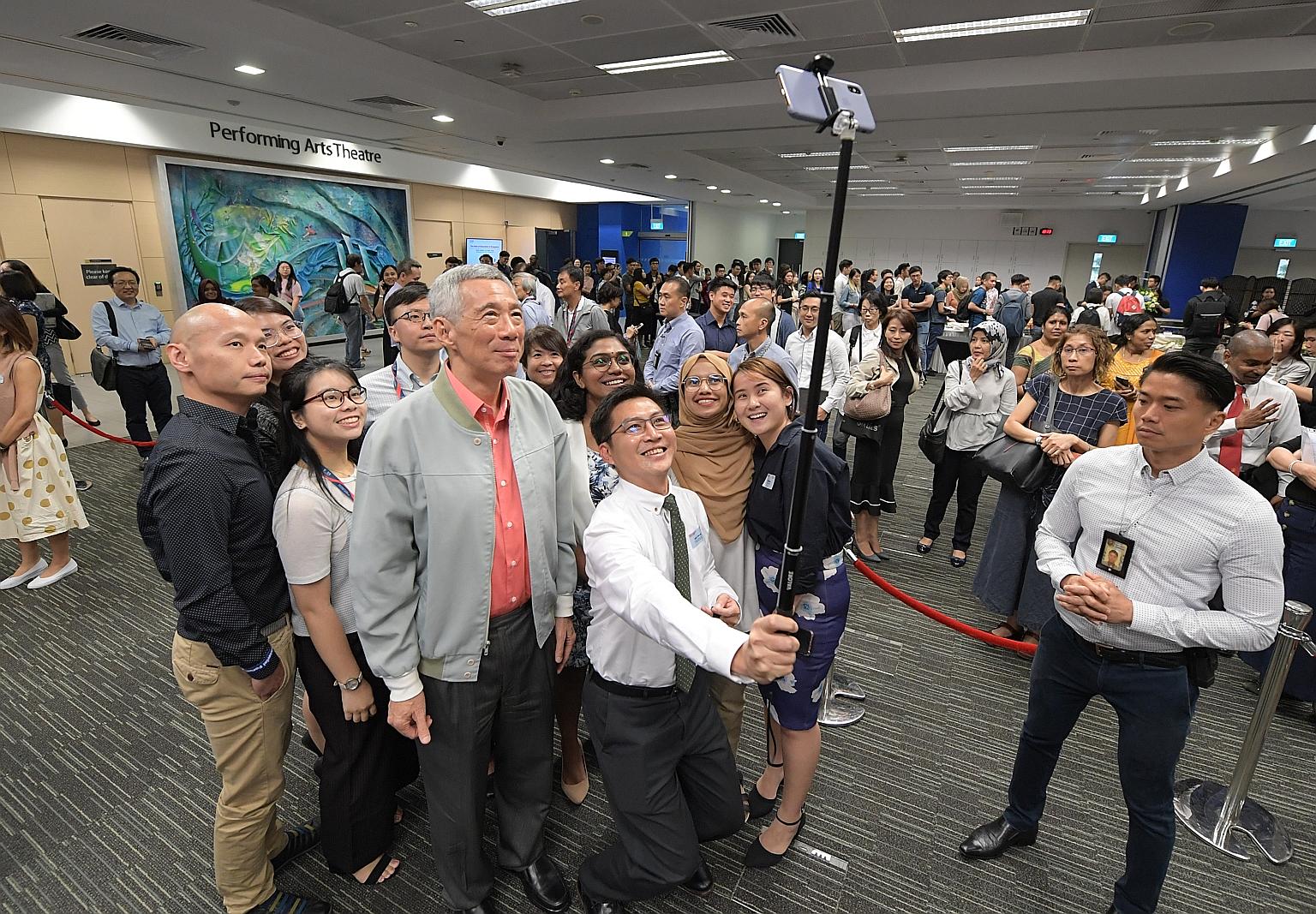Fees and bursaries for part-time tertiary students to be reviewed
Education system's biggest challenge is to be effective for continual learning, says PM Lee
Sign up now: Get ST's newsletters delivered to your inbox

Prime Minister Lee Hsien Loong taking a photo with participants of the Singapore University of Social Sciences' inaugural ministerial dialogue. Among the issues covered during the dialogue were the value of lifelong learning and a university education, as well as the future of work amid technological disruption.
ST PHOTO: ALPHONSUS CHERN
Fees and bursaries for part-time students will be reviewed, Prime Minister Lee Hsien Loong said yesterday, adding to his announcement at last month's National Day Rally that tertiary education will be more affordable.
And if necessary, these fees and bursaries will be adjusted, he said in a speech at the Singapore University of Social Sciences' (SUSS) inaugural ministerial dialogue.
He noted the Government has not yet revised the fees and bursaries for part-time students, although it had done so for full-time students through higher bursaries for lower-and middle-income university students, and lower fees for general degree programmes at SUSS and the Singapore Institute of Technology.
"We looked at them, but we think that these fees and bursaries should be affordable for working adults," he said, adding that the Government will review the situation and make changes where needed.
The value of lifelong learning and a university education as well as the future of work amid technological disruption were among the issues covered during a lively one-hour dialogue between PM Lee and about 500 SUSS students.
SUSS, which became Singapore's sixth autonomous university in 2017, offers full-time and part-time graduate and under-graduate courses.
PM Lee said the biggest challenge for Singapore's education system is to make it effective for continual learning.
He explained that it is not just a matter of money or about running courses, but having educational programmes that are suited to meet the learning needs and styles of adults - whether they are from Generation X or in their 70s.
Courses offered in polytechnics and universities have to be structured in a modular fashion, and lecturers have to adapt their teaching styles to help older people learn at their own pace, PM Lee noted.
A whole support system must also be in place so employers understand and make adjustments when their workers go for courses, and employees can focus on their jobs and studies and maintain a balance, he added.
"We will do it, we have got SkillsFuture SG. But we are still early on in the journey," he noted.
During the dialogue, PM Lee was asked how Singapore graduates fared against those from around the region, who may be more hungry and willing to work for lower pay.
"I think that we have to be hungry, too. Because if we are not hungry, somebody will steal our lunch," he said.
"It is a competition which we manage in Singapore because the inflow of talent, the inflow of people from other countries to Singapore, we manage, we track carefully their numbers, their standards, their proportions, to make sure they don't crowd Singaporeans out and Singaporeans have opportunities for the jobs."
But if Singaporeans are not up to scratch, companies will go around the region to look for talent, he noted.
Still, he believes Singapore has a workforce which is good, collective and productive - factors which have attracted firms like Finnish oil company Neste to invest here.
But there are not enough Singaporeans, due to the low fertility rate, and fewer are entering the workforce.
"And so, if we don't top ourselves up with talent from overseas... I don't think we will be able to take up all the opportunities which are available to us," he said.
"We open the door, they come, they complement us, we have to work hard. Yes. But we work hard, we hold our own."
One participant at the dialogue asked for advice on his employability as he felt there was a perception that the other universities were better than SUSS.
Responding, PM Lee said that to level the playing field, SUSS must maintain high standards and its graduates must fly the university flag high.
Each time Singapore added a new university, a niche was found for the institution, he said.
SUSS, which focuses on social sciences, gives students skills - conceptually and practically - to tackle important social issues, he added.
"If you can excel in that area, whether you graduate as a lawyer or (from) business, or in social work, or in sociology, or in communications, I think you establish yourself as a (graduate of a) first-class institution," said PM Lee.


